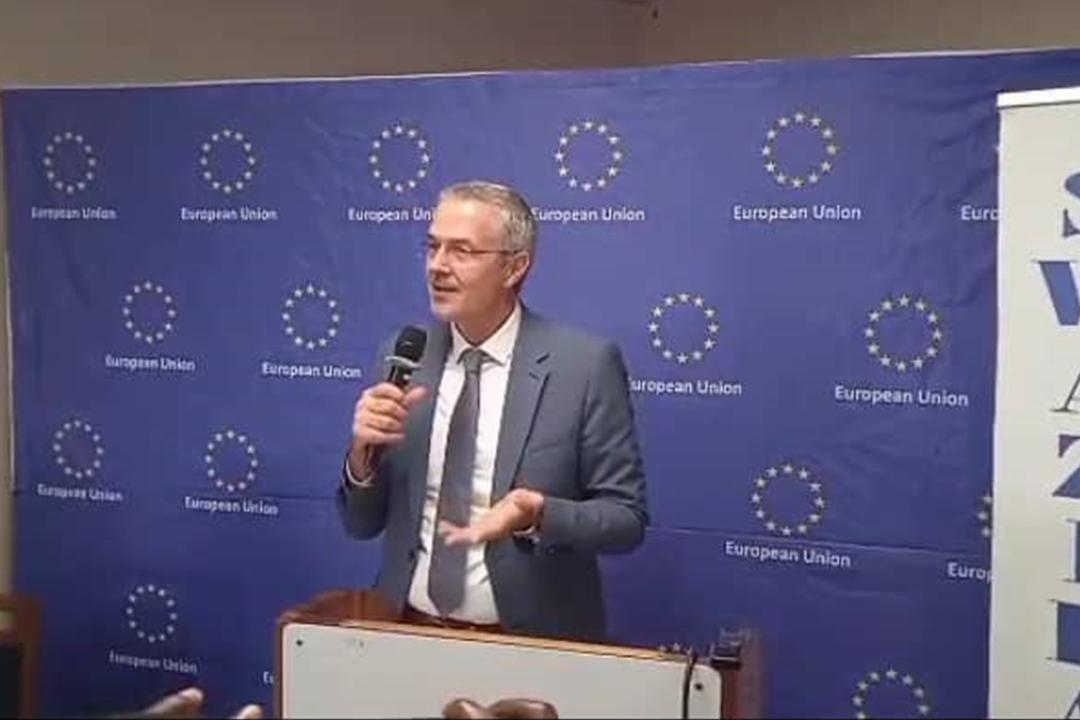Africa-Press – Eswatini. The European Union (EU) has contributed an amount of around E6 797 100 000 towards the development of Eswatini.
The €326 million (approximately E6 979 100 000) funding by the EU has been contributed over a period of 26 years. This information was shared by EU Ambassador to Eswatini Karsten Mecklenberg on May 2, 2025 at Mountain View Hotel. This was during the commemoration of the World Press Freedom Day.
The World Press Freedom Day was organised by the EU, in collaboration with the Swaziland Editors’ Forum. One of the funds is the 9th European Development Fund (EDF), which saw the contribution of €33 million (about E688 050 000) from 2001 to 2007.
The second funding is the 10th EDF, which saw a contribution of €70 million (about E1 459 500 000). This funding ran from 2008 to 2013. The third funding highlighted by the ambassador was the Sugar Accompanying Measures under which the EU contributed €120 million (about E2 502 000 000). The period in which the funding was disbursed was not mentioned.
The 11th EDF was presented by the ambassador as the fourth fund, under which the EU contributed €63 million (about E1 313 550 000). The funding ran from 2014 to 2020. Another funding is the Neighbourhood, Development and International Cooperation Instrument (NDICI) – Global Europe, under which €40 million (about E834 million) will be invested into Eswatini.
The funding started from 2021 and will run until 2027. The ambassador also talked about the Thematic Budget Lines and Regional Programmes where the EU would continue to support development initiatives in the country. The event was also attended by media practitioners (including editors, reporters), senior Government officials, and officials from the EU in Eswatini.
Students studying journalism and mass communication/media studies from the University of Eswatini (UNESWA) and Limkokwing University of Creative Technology (LUCT) were also in attendance. Many issues affecting journalists and other media practitioners were being discussed. The issues discussed including self-censorship and imposed censorship within the newsrooms.
Other issues included reception of bribes in order to block certain stories from being published. Journalists agreed that they should not be in a situation where they were going to justify receiving bribes, even if they earned little salaries. However, other scribes also mentioned that even if they agreed not to receive bribes, the issues of their welfare needed to be addressed by their employers. They believed addressing such issues could play a vital role in avoiding reception of brown envelopes.
Dr Evans, who is the Journalism and Mass Communication (JMC) Lecturer from the University of Eswatini (UNESWA) made a moving presentation on artificial intelligence (AI). He highlighted the beauty and the dangers of these AI innovations, calling upon journalists to be careful when using these technological discoveries.
The academic said AI helped journalists in producing well written articles, but they had to be careful because the AI could mislead the scribes to thinking they had the right information, when that would not be the case. He played several videos of USA President Donald Trump and Russia’s President Vladimir Putin. The videos looked so genuine such that people could believe them to be true.
Dr Evans also narrated a situation in one African country where there is a media institution that had 20 reporters, who produced news articles on a daily basis. However, the attendants were shocked when he told them that the institution and the reporters he talked about were non-existent.
He pleaded with journalists to continue to be credible because at this time and age, the organisations for which they would be used as points of reference because they were still believed to be credible. The EU ambassador also pleaded for the same from the journalists, stating the important role they kept playing in informaing the citizens around the world.
Mecklenberg reminded journalists that they still remained the members of the fourth estate and people still relied on them for reception of credible information. He believed that journalists in this country were still protected from the level of lies and fake news articles that were being peddled on social media.
For More News And Analysis About Eswatini Follow Africa-Press







